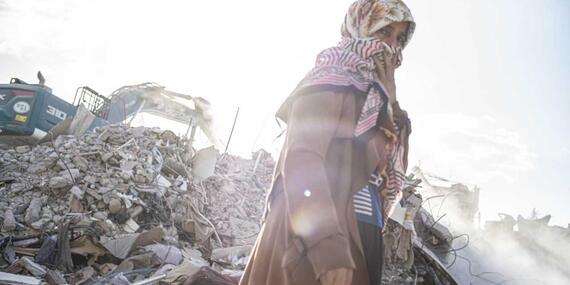Today's top news: Türkiye, Syria, Ukraine, Tropical Cyclone Freddy

Türkiye
Yesterday’s earthquakes struck Hatay, in the south of the country. The 6.4-magnitude earthquake was followed by a 5.8-magnitude aftershock three minutes later and some 90 additional aftershocks.
The earthquakes were felt throughout the region, including in northwest Syria. The Turkish Government says six people were killed and at least 294 people were injured, with ten buildings having collapsed.
We continue to support the coordination of search-and-rescue operations in Türkiye, and UN Disaster Assessment and Coordination teams remain active in Malatya, Kahramanmaras, Adiyaman, Gaziantep, and Hatay.
At the time of the earthquakes yesterday, there were 25 international urban search-and-rescue teams still in the country. Eighteen of those were in Hatay, with three of them deploying immediately to the affected areas. An UN team, which is located inside the Turkish Government’s crisis center, coordinated with Turkish authorities in real time to dispatch these urban search-and-rescue teams immediately.
At least 26 Emergency Medical Teams are active in the affected area and helped those who were injured in the latest earthquake.
We are also coordinating rapid needs assessments in the affected locations.
We continue to work with our partners to deliver critical supplies, including emergency shelter materials, blankets, hygiene kits, medical supplies, and kitchen items to support the humanitarian response led by the Government of Türkiye.
The Türkiye Flash Appeal is 1 per cent funded, with $11.8 million received towards the $1 billion plan.
Syria
In Syria, yesterday’s earthquake injured at least 195 civilians in Aleppo and Idlib, according to initial reports, and caused further damage to buildings.
The UN and our partners continue to scale-up cross-border aid operations from Türkiye into northwest Syria.
Earlier today, 38 trucks from the World Food Programme (WFP), the UN Refugee Agency, UNHCR and the International Organization for Migration crossed through the Bab al-Hawa and Bab al-Salam border crossings into northwest Syria, delivering food and other supplies.
Since 9 February, a total of 265 trucks carrying aid from six UN agencies have crossed from Türkiye into northwest Syria via three crossing points: Bab al-Hawa, Bab al-Salam and Bab al-Ra’ee. The assistance provided includes food, shelters, cholera testing kits and high-energy biscuits. Local partners are distributing aid on the ground.
A rapid assessment found that shelter, winterization and cash are the top priorities for displaced people. Health care needs are also urgent. At least 20 per cent of the more than 600 communities assessed have no access to healthcare.
Even before the earthquakes, food prices were already skyrocketing in Syria. As of the second week of February, the price of key commodities such as bread, lentils, vegetable oil, sugar and rice increased in most governorates hardest hit by the earthquakes.
Funding remains essential for the wider earthquake response — as of today, the Syria Flash Appeal is 17 per cent funded, with $68.5 million received towards the $329.1 million plan.
Ukraine
Our partners on the ground have condemned another attack that has killed and injured civilians a few hours ago in the centre of Kherson city.
The strike hit a busy street of Kherson, in the middle of the afternoon according to our humanitarian partners there. Local authorities said some 6 civilians were killed and another 16 injured. Most of them were standing at a bus stop when the attack happened.
The UN Human Rights Monitoring Mission in the country are trying to verify the number of civilians casualties and told us that this death toll might increase even further.
This has not been the only incident in recent hours. Yesterday, for example, a number of schools and dozens of homes were hit in different parts of eastern Ukraine. We reiterate that international humanitarian law must be respected, and civilians and civilian infrastructure has to be protected in Ukraine.
Tropical Cyclone Freddy
Tropical Cyclone Freddy had made landfall down on the eastern coast of Madagascar, after passing north of Mauritius and La Reunion islands yesterday with strong winds and heavy rains.
It was projected to touch down near Mananjary, in an area that is still struggling to recover from the impacts of cyclones Batsirai and Emnati one year ago, destroying homes, infrastructure and crops.
Cyclone Freddy is expected to bring devastating winds and a very dangerous sea state in Madagascar. The cyclone is projected to emerge in the Mozambican Channel later this week and re-strengthen before landing in Mozambique and potentially reaching Zimbabwe.
About 2.6 million people in Madagascar, Mozambique and Zimbabwe could be impacted by wind speeds of 120 kilometers per hour, according to the WFP’s Automated Disaster Analysis and Mapping.
Governments in the three affected countries are leading operational readiness activities. In Madagascar, the UN and our humanitarian partners have pre-deployed about 80 staff and pre-positioned emergency stocks to areas likely to be impacted. Two aircrafts are on standby to facilitate assessments and response.
There is an urgent need for additional supplies.
